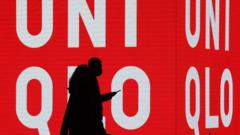Fast Retailing's CEO's statement about Uniqlo's cotton sourcing leads to widespread calls for boycott on social media platforms.
**Uniqlo's Xinjiang Cotton Comments Ignite Controversy in China**

**Uniqlo's Xinjiang Cotton Comments Ignite Controversy in China**
Public backlash ensues as the Japanese retailer clarifies its sourcing practices amidst claims of forced labor in Xinjiang.
In an unexpected twist, global clothing retailer Uniqlo finds itself at the center of a social media storm in China following comments made by the CEO of its parent company, Fast Retailing. Tadashi Yanai confirmed in a recent BBC interview that Uniqlo does not source cotton from Xinjiang, a region embroiled in controversy due to allegations of forced labor involving the Uyghur Muslim minority.
The backlash was swift, with Chinese netizens taking to the popular social media platform Weibo, calling for a boycott of Uniqlo. The hashtag #ControversyOverUniqloFoundersRemarks quickly gained traction, along with other trending tags like #XinjiangCottonIsTheBestInTheWorld and #ISupportXinjiangCotton, which collectively highlighted national pride in Xinjiang's cotton industry.
One commenter expressed frustration over Yanai’s perceived arrogance, stating, “With this kind of attitude from Uniqlo…can we stand firm this time?” The online furor indicates a significant segment of Chinese consumers who view Yanai’s remarks as dismissive of local products and communities.
In his interview, Yanai stated, “We’re not using [cotton from Xinjiang],” but soon clipped his comments, suggesting they could lead to political complications. Given that China represents a vital market and manufacturing base for Uniqlo, the retailer's stance potentially jeopardizes its standing among Chinese consumers.
China has denied allegations of forced labor raised by various organizations and Western governments. However, the fallout for other multinationals has been substantial; brands like H&M and Nike have faced significant backlash and boycotts in China for similar stances against Xinjiang cotton.
As scrutiny caps off, industry analysts predict that Uniqlo’s popularity in China may take a hit, recalling the experience of other brands that found themselves caught in similar controversies. In a present-day context, China's commerce ministry has even commenced an investigation into PVH Corporation, the parent company for Calvin Klein and Tommy Hilfiger, for purportedly boycotting Xinjiang products without factual basis.
Uniqlo's predicament illustrates the delicate balance brands must maintain when navigating complex international issues of labor rights, nationalism, and consumer sentiment in the ever-competitive global marketplace.
The backlash was swift, with Chinese netizens taking to the popular social media platform Weibo, calling for a boycott of Uniqlo. The hashtag #ControversyOverUniqloFoundersRemarks quickly gained traction, along with other trending tags like #XinjiangCottonIsTheBestInTheWorld and #ISupportXinjiangCotton, which collectively highlighted national pride in Xinjiang's cotton industry.
One commenter expressed frustration over Yanai’s perceived arrogance, stating, “With this kind of attitude from Uniqlo…can we stand firm this time?” The online furor indicates a significant segment of Chinese consumers who view Yanai’s remarks as dismissive of local products and communities.
In his interview, Yanai stated, “We’re not using [cotton from Xinjiang],” but soon clipped his comments, suggesting they could lead to political complications. Given that China represents a vital market and manufacturing base for Uniqlo, the retailer's stance potentially jeopardizes its standing among Chinese consumers.
China has denied allegations of forced labor raised by various organizations and Western governments. However, the fallout for other multinationals has been substantial; brands like H&M and Nike have faced significant backlash and boycotts in China for similar stances against Xinjiang cotton.
As scrutiny caps off, industry analysts predict that Uniqlo’s popularity in China may take a hit, recalling the experience of other brands that found themselves caught in similar controversies. In a present-day context, China's commerce ministry has even commenced an investigation into PVH Corporation, the parent company for Calvin Klein and Tommy Hilfiger, for purportedly boycotting Xinjiang products without factual basis.
Uniqlo's predicament illustrates the delicate balance brands must maintain when navigating complex international issues of labor rights, nationalism, and consumer sentiment in the ever-competitive global marketplace.

















